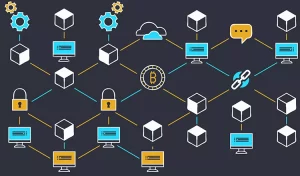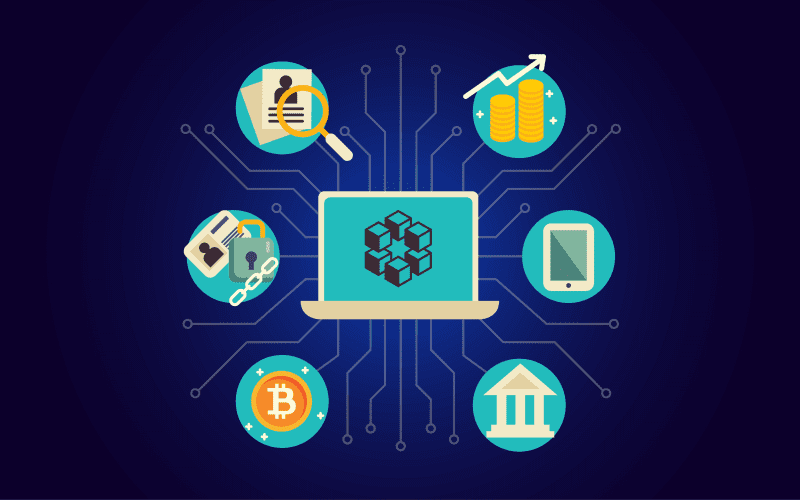The Intersection of Blockchain and Supply Chain
Supply chain management has always been a complex endeavor, fraught with challenges like inefficiencies, lack of transparency, and high operational costs. Enter blockchain technology. Originally created to support cryptocurrencies like Bitcoin, blockchain is now revolutionizing industries far and wide—including supply chain management.
Combining the decentralized, secure, and transparent nature of blockchain with the growing complexities of modern supply chains, this pairing promises to eliminate inefficiencies on a global scale. But how exactly does blockchain in supply chain management work, and what does the future hold?
This article dives deep into blockchain’s role in supply chain technology, examines market reports forecasting its potential by 2025, and highlights real-world applications that prove its transformative capabilities.
Understanding Blockchain Technology in the Context of Supply Chain Management

Blockchain is essentially a decentralized ledger. Transactions or data entries (known as “blocks”) are linked sequentially to create an immutable record. This means once data is added, it cannot be altered without the consensus of all participants in the network.
For supply chain management, this translates into end-to-end visibility, improved trust, and enhanced operational efficiency. From tracking the origin of raw materials to ensuring fair trade policies are followed, blockchain provides unparalleled transparency across the supply chain.
Key features of blockchain in the supply chain include:
- Transparency: All participants have access to the same data, reducing opportunities for fraud or miscommunication.
- Traceability: With blockchain, identifying the origin of products becomes simpler and faster, ideal for industries like food safety or luxury goods.
- Efficiency: By removing intermediaries, blockchain speeds up processes and reduces operational costs.
Now that we understand the basics, let’s explore the specific challenges blockchain seeks to address in supply chain management.
Current Challenges in the Supply Chain Industry and How Blockchain Addresses Them
The supply chain industry faces several pain points that blockchain is uniquely positioned to solve.
1. Lack of Transparency
Global supply chains often involve multiple stakeholders—manufacturers, suppliers, transportation companies, and customers—all working in silos. This fragmented nature makes it difficult to ensure transparency and accountability. Blockchain creates a single source of truth, enabling each stakeholder to view accurate and updated information in real-time.
2. Fraud and Counterfeit Products
Counterfeit goods cost the global economy an estimated $500 billion annually. Blockchain can authenticate goods by verifying their origin, ensuring that consumers receive genuine products. This is particularly crucial for pharmaceuticals and luxury items.
3. Inefficiencies in Record Keeping
Traditional supply chains rely on paper-based processes prone to human error, duplication, and delays. Blockchain automates record-keeping, reducing reliance on manual paperwork and increasing operational efficiency.
4. Ethical Concerns
Whether it’s child labor or unsustainable practices, stakeholders increasingly demand ethical standards in supply chains. Blockchain enables companies to track and validate compliance with environmental and labor regulations.
By addressing these challenges, blockchain improves overall supply chain technology, providing immediate benefits to businesses and consumers alike.
Market Report: The Projected Impact of Blockchain on the Global Supply Chain by 2025

The numbers tell a compelling story. According to market reports, blockchain in the supply chain market is projected to grow from $253 million in 2020 to $3.4 billion by 2025, at a compound annual growth rate (CAGR) of 67.3%.
Key Drivers of This Growth Include:
- Demand for Transparency: With global trade expanding rapidly, greater transparency is no longer optional but essential.
- Rising Counterfeit Concerns: Governments and industries are cracking down on illegal goods, driving the need for traceability.
- Technological Innovation: Integration of blockchain with AI and IoT devices amplifies its impact, creating smart, self-analyzing supply chains.
Regional Growth Insights:
- North America leads in blockchain adoption, particularly in sectors like pharmaceuticals and food safety.
- Asia-Pacific, home to vast manufacturing hubs, is rapidly integrating blockchain to optimize supply chains and gain a competitive advantage in global markets.
This market growth is not merely driven by hype; it is validated through the real-world applications that follow.
Real-World Applications and Case Studies
Blockchain is not just a futuristic concept—it’s already making an impact across industries.
Walmart and Food Safety
Walmart, in partnership with IBM’s Food Trust Blockchain, uses blockchain to track the origin of fresh produce. With blockchain, the company can trace a product’s supply chain history in just 2.2 seconds, compared to the seven days it previously took. This minimizes the spread of contaminated food, enhancing consumer safety.
De Beers and Diamond Tracking
De Beers, a global leader in diamond mining and trading, leverages blockchain to track sustainable and conflict-free diamonds. This ensures ethical sourcing and builds consumer trust.
Maersk and Global Trade
Shipping giant Maersk developed TradeLens, a blockchain-based platform, to digitize the global shipping process. TradeLens reduces processing times by 40% and eliminates paperwork, saving billions annually for the supply chain industry.
These real-world applications demonstrate the enormous potential of blockchain. But what does the future hold?
The Future of Blockchain in Supply Chain Management
Blockchain’s integration into supply chains has only just begun. By 2030, experts predict a fully automated, AI-driven, and blockchain-supported supply chain.
Trends That Signal the Future:
- Integration With IoT
IoT devices can feed real-time data into blockchain networks, enhancing traceability. Combined, these technologies will create “smart” supply chains capable of automatic adjustments.
- Standardization
Governments and trade organizations are working towards standardizing blockchain protocols, which will streamline adoption across industries.
- Expansion Into Smaller Enterprises
While large enterprises lead the charge, affordable blockchain solutions for SMEs will democratize access to this technology, unlocking its benefits for smaller players in global trade.
For supply chain managers, this presents a golden opportunity to stay ahead of the curve.
Key Takeaways for Supply Chain Managers, Tech Enthusiasts, Investors, and Entrepreneurs

- For Supply Chain Managers: Start exploring blockchain-powered platforms to improve transparency and efficiency.
- For Tech Enthusiasts: Blockchain offers exciting opportunities, especially when paired with complementary technologies like AI and IoT.
- For Investors: The blockchain supply chain market is poised for massive growth. Now is the time to invest in groundbreaking solutions.
- For Entrepreneurs: Innovative applications of blockchain can disrupt traditional supply chains and open new business opportunities.
Preparing for a Blockchain-Powered Transformation
Blockchain is no longer just a buzzword; it’s becoming the backbone of modern supply chains. For supply chain managers, tech enthusiasts, investors, and entrepreneurs, the question isn’t if blockchain will transform supply chain management—it’s when.
By 2025, blockchain is expected to reshape global supply chains, unlocking levels of transparency and efficiency previously unimaginable. To stay competitive in this rapidly evolving landscape, organizations must act now.
Want to learn more or explore how blockchain could work for your business? Stay informed, connected, and prepared as the future of supply chain technology unfolds.











